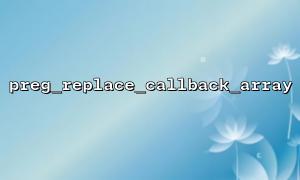In PHP, the preg_replace_callback_array function is a very powerful tool for replacing parts of a string that conform to multiple regular expression patterns. Compared with traditional preg_replace , it supports passing multiple modes and corresponding callback functions at a time, thereby implementing complex batch replacement logic.
In actual use, developers often use anonymous functions (closure) as callback functions. This method brings many conveniences, but also has some potential disadvantages. This article will analyze in detail the advantages and disadvantages of using anonymous functions in preg_replace_callback_array .
preg_replace_callback_array accepts two parameters:
patterns : an associative array, the key is a regular expression, and the value is the corresponding callback function.
subject : A string to be processed.
Sample code:
<?php
$text = "Visit http://example.com and https://example.net";
$result = preg_replace_callback_array([
'/http:\/\/[a-z\.]+/' => function($matches) {
return str_replace('example.com', 'm66.net', $matches[0]);
},
'/https:\/\/[a-z\.]+/' => function($matches) {
return str_replace('example.net', 'm66.net', $matches[0]);
}
], $text);
echo $result; // Output:Visit http://m66.net and https://m66.net
Anonymous functions are written directly in the callback array, making regular expressions closely bound to processing logic, making it easy to understand and maintain.
By using the use keyword, anonymous functions can easily access external variables without defining global variables or class attributes.
<?php
$domain = 'm66.net';
$result = preg_replace_callback_array([
'/http:\/\/[a-z\.]+/' => function($matches) use ($domain) {
return str_replace('example.com', $domain, $matches[0]);
}
], $text);
Anonymous functions have no names, which reduces the pollution of global namespace and avoids the problem of callback functions being duplicated.
When the replacement logic is simple, anonymous functions can quickly write test code without the need to declare multiple callback functions separately.
Anonymous functions cannot be reused in multiple places like named functions. If the replacement logic is similar but the details are different, the code may be duplicated.
Anonymous functions do not have function names, and it is not easy to locate specific functions in debug stack information, which brings trouble to the investigation of complex problems.
When the callback function content is long or complex, writing anonymous functions directly into the array will cause the code to appear bloated, which is not conducive to reading and maintenance.
Although the difference is small, the calling performance of anonymous functions is usually slightly lower than that of named functions, especially when there are a large number of calls, which may affect performance.
Using anonymous functions in preg_replace_callback_array can make the code more concise and compact, and quickly implement replacement logic. It is especially suitable for simple callback functions that do not require reuse. However, when the replacement logic is complex or requires multiple reuse, named functions will be more conducive to code maintenance and debugging.
suggestion:
Simple replacement scenarios prioritize anonymous functions;
Complex, general callback logic suggests defining named functions or class methods.
This not only makes full use of the flexibility of anonymous functions, but also avoids potential flaws, and writes efficient and easy-to-maintain PHP code.
<?php
$text = "Check out http://example.com and https://example.net for more info.";
$domain = 'm66.net';
$result = preg_replace_callback_array([
'/http:\/\/[a-z\.]+/' => function($matches) use ($domain) {
return str_replace('example.com', $domain, $matches[0]);
},
'/https:\/\/[a-z\.]+/' => function($matches) use ($domain) {
return str_replace('example.net', $domain, $matches[0]);
}
], $text);
echo $result; // Output:Check out http://m66.net and https://m66.net for more info.















